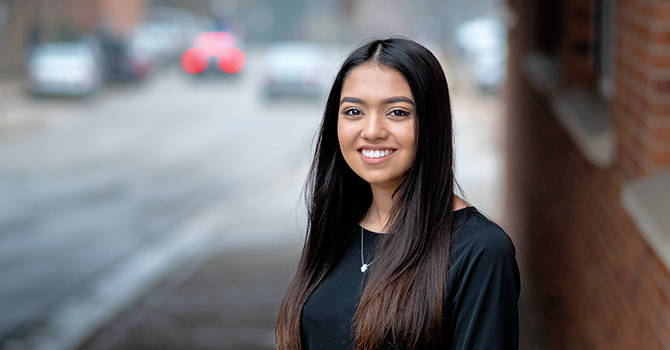Seeking the Most Positive Impact: How Public Health Will Make Me a Better Doctor

Narmeen Rehman
Bachelor's Student in Public Health
Growing up here in Michigan, I experienced many subtle, formative moments that pushed me toward my interest in health and medicine. My mom is a physician, so I spent a lot of time with her at the hospital and clinic where she worked. It wasn't until I became a student at Michigan that I fully realized the impact these moments had on my interests.
From a young age, I was able to see that health is at the core of everything in our lives. For me, nothing seems more gratifying than working to improve it.
A specific moment upheld this realization. When I was 14, my entire family came to Florida from both Pakistan and Michigan and surprised my great aunt at the hospital where she was being treated for cancer. She played a huge role in my life growing up. When the doctor came to meet our family, I recognized that working with one patient directly doesn't only affect that individual. It's every single person around them - their spouses who sit with them through every appointment, their children who care deeply for them, and their community members who rely on them.
This moment convinced me that I wanted to have a positive impact on the health field. As I navigated my first two years as an undergraduate student, public health became more and more the answer to that.
What drew me most to the field is its foundation in equity and advocacy.
I came to Michigan with the intent of becoming a physician but was not sure what major would help me get there. I kept an open mind, practically changing majors every week as a freshman. Nothing quite fit the bill for me until I discovered public health. A close friend who knew my interests and background nudged me to take Public Health 200. I was immediately captivated by the course because I realized that public health is everywhere. What drew me most to the field is its foundation in equity and advocacy. Ultimately, that course gave a lot more meaning to the experiences I was seeking out at Michigan.
As a freshman, I began conducting community-based research on stroke disparities in Flint with the Skolarus Lab. Our team works on multiple projects, the main one being an intervention program called Stroke Ready. There are major disparities in stroke outcomes and Flint has one of the lowest rates of acute stroke treatment of any other region its size in the United States. The goal of Stroke Ready is to increase community education regarding stroke preparedness and also optimize acute stroke care in hospitals. This has been an incredible experience because it directly relates to coursework topics such as health disparities, social determinants of health, and community-focused health promotion.
Having an opportunity to work in the community provides an incredible layer of depth and understanding to these concepts and allows me to see public health in action. For example, in class, we'll compare interventions and policies have a significant impact to those that do not work. A majority of the time we saw that interventions that fail to impact underserved populations do so because they lack the voices that matter the most at the table. What I love most about the work in Flint is that it's bringing the community right to the center of the table and elevating their voices. It's really powerful to see that collaboration and the innovation that can come out of bringing different perspectives together for one goal.
We often see that people pit public health against medicine, and focus on the differences between the two fields. Through my experiences and coursework, I have come to understand that these fields are more complementary in nature. Good health begins in our homes, workplaces, classrooms, and neighborhoods.
I've been involved with Central Student Government as a co-chair for the mental health taskforce. In this role, I've been able to work with students, administration, and various stakeholders on campus to improve areas of student life such as access to mental health resources on campus. There's a huge crisis on college campuses around the nation regarding mental health and this gave me the opportunity to advocate for my peers firsthand. I think there's a misconception that making an impact comes after a graduation. Through my extracurriculars I learned the complete opposite is true -- as students we have an extremely powerful voice and we don't have to wait to start making change.
I hope that I can take what I've learned from my public health education into my future practice of medicine. We often see that people pit public health against medicine, and focus on the differences between the two fields. Through my experiences and coursework, I have come to understand that these fields are more complementary in nature. Good health begins in our homes, workplaces, classrooms, and neighborhoods. When you're treating an individual, it's important to look at their case on a macro level, examining the social determinants of health that bring them into your office — health equity can only be achieved by looking at the entire picture. I look forward to a future of advocating to bridge gaps between health disparities and disciplines.
